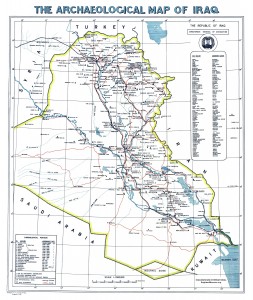“Obliterate”…
…from the Latin oblitteratus, meaning “to cause to be forgotten.”
In the modern sense, to obliterate means to “remove all traces of memory from the earth, to destroy utterly.” (Dictionary.com)
A powerful message about the potential for Iraqi culture’s obliteration greets users who try to enter the Baghdad Museum International’s webpage (the full site can be viewed here).
The destruction of a nation’s cultural heritage is often considered to be a lesser issue when we are confronted with the brutal reality of war. No object, no matter its history, is more important than human life. The accidental destruction of cultural heritage is often considered an unintended, unfortunate casualty in war.
However, this is not what is happening in Iraq and Syria. These nations’ historical sites and artifacts are being purposefully targeted and systematically destroyed by ISIS in public displays of power, captured on film for shock value.
An interactive map depicting ISIS’ movements on sites of historical importance has been created by the New York Times.

Image credit goes to the Baghdad Museum International. Click the image to view image larger in a different window.
Why Is this Happening?
There are three steps to obliterate a people: take away their history, their homes, and their hope. Remove all traces of their cultural identity so that within a few generations, they have no memory of what life was like before the current era and how it could be that way again.
This is not new information, and this is not the first time it has happened within history, or even within the last few decades in Iraq.
It is important to note that after World War II, many world nations (including Iran, Iraq, and the Syrian Arab Republic) came together and signed the Convention for the Protection of Cultural Property in the Event of Armed Conflict with Regulations for the Execution of the Convention 1954 to try to protect cultural heritage.
Past History
In March 2001, the Bahimyan Buddhas were destroyed by the Taliban.
Nearly 13 years later in 2014, Rod Nordland of the the New York Times went to the Bamiyan province to view the conservation progress on the Buddha statues.
German archaeologists have speculated reconstruction, but UNESCO and other international agencies question the historical integrity of reconstruction when the remnants of the Buddhas have been so totally demolished.
In 2003, Baghdad’s Iraq Museum was horrifically looted during the chaos of war and the Baghdad National Library was set ablaze.
Happening Now
Now, in 2015, the Baghdad National Library races to digitize manuscripts under threat of destruction from ISIS. Manuscripts are some of the only copies of histories of the Iraqi people and the land.
The Baghdad National Library is not only organization working to preserve history but also restore hope to territories reclaimed from ISIS.
In her article for Business Insider on this issue, Vivian Salama writes about how Iraq is rushing to digitize its national library due to the threats presented by ISIS. She took the following statement from the acting director of Baghdad libraries and archives, Jamal Abdel-Majeed Abdulkareem:
The militants “want history to reflect their own views instead of the way it actually happened,” Abdulkareem said. “So when an area is liberated, we send them books to replenish whatever was stolen or destroyed, but also, so that Iraqis in this area have access to these materials so they can always feel proud of their rich history.”
The Baghdad National Library is an incredible example of a library serving their community through preservation, but–more importantly–also a library actively reaching out into the community to provide needed resources. Anyone interested in reading what the United States has been doing to provide help since 2003 can look to the Iraq Cultural Heritage Initiative.
If you are interested in learning more about the events surrounding this digitization movement, additional informational resources are available here, here, and here.
Have you got a comment about this issue? Please leave your thoughts in the comments!


